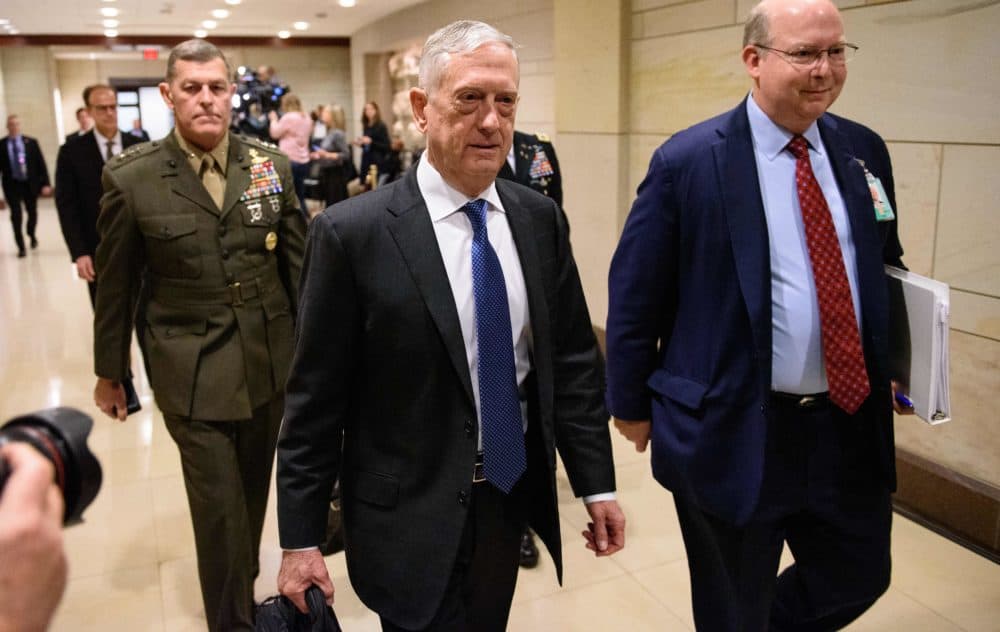Advertisement
Former Defense Secretary Hagel On Mattis: 'I Don't Think Jim Had Any Choice'

Jim Mattis resigned Thursday night as secretary of defense, following President Trump's decision to pull 7,000 troops out of Afghanistan and withdraw all American forces — around 2,000 troops — from Syria.
Mattis disagreed with both of those troop decisions, writing in his resignation letter to Trump, "We must do everything possible to advance an international order that is most conducive to our security, prosperity and values, and we are strengthened in this effort by the solidarity of our alliances."
Chuck Hagel, who served as defense secretary from 2013 to 2015 under the Obama administration, says he "absolutely" would have resigned if faced with similar circumstances.
"I don't think Jim had any choice, if he was going to salvage his reputation and everything that he has worked for and stood for his entire life," Hagel tells Here & Now's Peter O'Dowd. "I don't think he wanted to continue to be an enabler of President Trump."
A nuanced discussion about American objectives in Syria and Afghanistan is one that's overdue and worth having, Hagel says, but Trump's decision to remove troops so abruptly is the wrong way to spark it.
"I'm one who thinks that we need a good examination ... of what we're doing there and why we're there. But not the way President Trump has done it," he says. "The way he's done it is very dangerous."
Interview Highlights
On his reaction reading Mattis' resignation letter
"I think Secretary Mattis' letter is exactly the right kind of letter, because it is not only a gentleman's resignation letter, but it makes the points that I think are really critical here — in foreign policy, our alliances, our relationships around the world, how they're interconnected, how the world order is important, it is relevant to our security. In fact, I read Secretary Mattis' letter twice ... I think it's just an excellent summary of our priorities and where we should be, and a reminder of who we are.
"He understands — and I think most of us who have served in government and have had that privilege — that our government is not a one-man show. It's about many, many factors and interests and consequences of actions, and consequences of inaction. I think the secretary had no option to do other than to resign, and I sure would have resigned."
"I read Secretary Mattis' letter twice ... I think it's just an excellent summary of our priorities and where we should be, and a reminder of who we are."
Chuck Hagel
On concerns about the loss of military and government expertise in the White House
"It is a concern, and I think there was a loss of competent, experienced, thoughtful people even before Jim Mattis resigned and some of the other generals resigned. President Trump has only one way to deal, and his idea is he makes decisions and announces them on Twitter. He really has no appreciation for the way our government works, and that's really dangerous in this kind of a dangerous world, with so much swirling around and technologies and factors that we've never seen before.
"So yes, it's very much a concern and ... I'm sure the Congress, both Democrats and Republicans, are very concerned about this, and all of our allies around the world who have come the last two years to distrust us, and feel that they can't rely on us and can't rely on our word. When you continue to malign your allies and your friends that we've had and relied on for 70 years since World War II, that's very dangerous. It will always have a consequence, and not only just our national security interests, but our economic interests — they're all tied together."
Advertisement
On how Trump approached withdrawing troops from Syria and Afghanistan
"I think there are two issues on that. One is how he did it, and when he did it — the timing — and the other issue is the issue itself. I think the issue itself needs to be looked at. I think it needs to be debated. I think the Congress needs to look at this. I mean, for example, we've been using the same authorization for military force since 2001 and 2003, resolutions that we passed in the Congress — 18 years now in Afghanistan. We need to understand, what's the strategic objective in Syria or Afghanistan? Now I know they talk about, 'Well, we're going to drive the Iranians out of Syria.' Well that's folly. You're not doing to drive the Iranians out of Syria with 2,000 troops, up in the northeast corner of Syria. So yes, I think it's a serious issue that needs some serious attention."
On whether the time is right to withdraw from Afghanistan
"Under some circumstances, it may be, and Syria as well. I think it's appropriate. I don't join those who say, 'Oh, it's crazy to be pulling our troops out of Syria,' or pulling half our troops out of Afghanistan. I think we need a thoughtful examination of that. But again, the essence is, what is the strategic objective? What do we want to accomplish? What do we think we can accomplish by this? Not just the same old, 'Well just hang in there, let's just hang in there,' and we go through another 10 years or 18 years or whatever it is, for what?"
Alex Ashlock produced and edited this interview for broadcast. Jack Mitchell adapted it for the web.
This segment aired on December 21, 2018.
